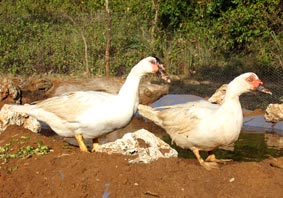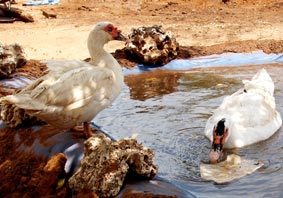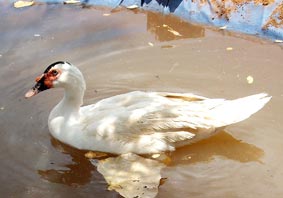| Farm
animals.
On our farm, of course, there we have animals which at night have a fixed habitation or a shelter. This includes 4 goats and 5 to 15 chickens (number varies by descendants). But the two ducks have not survived more than six months. Unfortunately they were eaten by nocturnal predators. |
|
||||
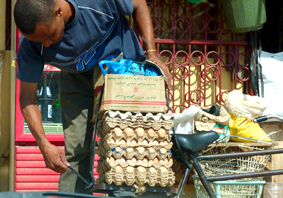 |
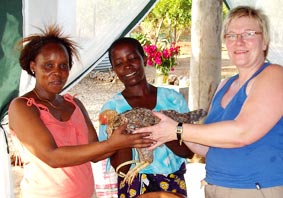 |
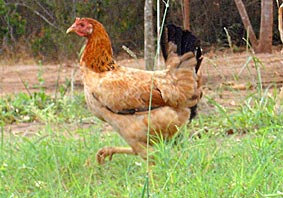 |
||
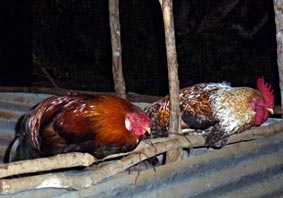 |
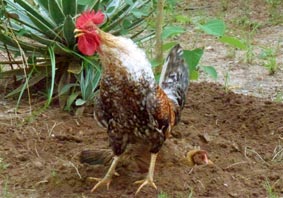 |
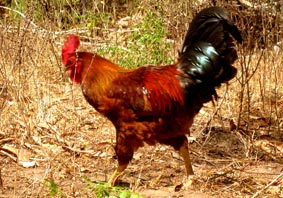 |
||
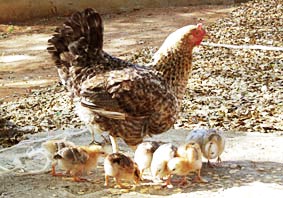 |
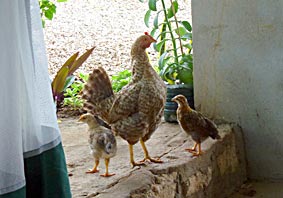 |
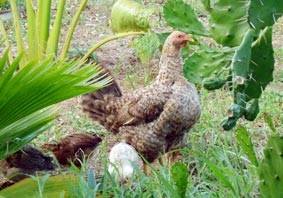 |
||
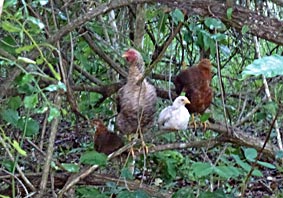 |
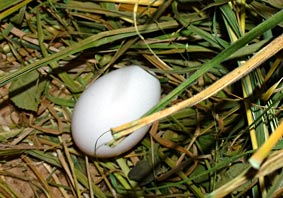 |
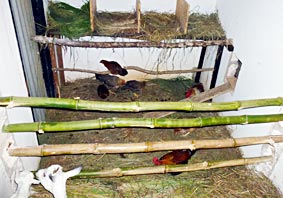 |
||
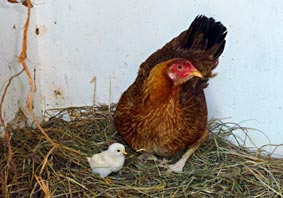 |
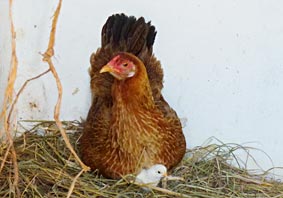 |
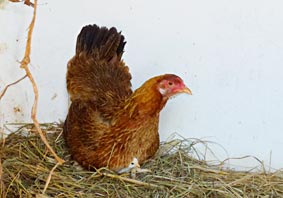 |
||
| The
hard life of chickens in Africa.
The advantage, if you own chickens, of course, are the fresh eggs for breakfast. For us this means that we rarely have to buy the eggs. In Kenya fresh eggs are even more expensive than in Germany, however, whether this is always prescribed as in our cold chain is maintained, no one can guarantee. In the beginning we had 2 roosters and 3 hens. I do not remember exactly where they all came from. Some times visitors from the neighborhood they had brought as a present. From this time on then a real big chicken family grew on, but at that time still we had no real chicken house, but they only spent the nights in a wind-and weather-proof shelter. Actually I wanted to write something funny about our chickens, but the chickens are not originally on the "animals of Africa", but really need to fight hard to survive in the wild. This struggle for survival of our chickens I want to tell with some examples. These chickens are really tough, they are constantly on guard not to be eaten himself and spent the first years of the day in the surrounding wilderness. But before it got dark, they always came back to her hut, drank and ate a little and sat down on her bed poles. The next morning, the rooster has awakened all, we have fed them again and then they are pulled back into the bush and have served with beetles, worms and other goodies from the wilderness and thus certainly found a more balanced diet, as we would ever be able to offer. But life in the wilderness can be cruel. We have very often experienced especially with the chickens. A hen had e.g. 13 chicks after just under a year there were only 3 of them left. We have seen with our own eyes many times how eagles or other birds of prey dart quickly rushed to the chickens and quickly disappeared with the booty in the air. Every time there was hours of heart-rending cry of the hen who has just lost a chick again, yet they are always really careful and also warn each other when danger threatened from the air. But the Eagles are so fast, the attacks we could perceive a shadow only with the naked eye. But not only from the air also dangers lurking in the forest. There are both diurnal and nocturnal predators which are just apart on newly hatched chicks there. This can be for example some snakes but also big cats such as the serval or the genet. Lions, there is no more, however, but he number of poaching dogs is increasing. One morning we were having breakfast, ran a screaming fear of death hen on our farm and has apparently asked for help. But the hen was not alone, she had a very tiny chicks like that just could just run. We have her quickly built a makeshift nest of fresh grass in the storage room and gave her a new home with it. What was happening, we could only guess. This hen had built a nest in the nearby bush, whose existance we did not know before. That's why she did not come back in the evening to sleep in the shelter. We had already written off. Meanwhile, they probably had to give birth. Probably the chicks have hatched last night in their nest. Unfortunately, it must be then attacked the little chicken family above already mentioned predator. Then the hen and her cub ran for their lives and were able to escape just as certain death. The rest of the family was probably a tasty meal. We have searched the nearby woods, but never found the nest. But that the drama is not over yet and the fate put another on top of it. After about three weeks, the chicken always remained close to us now, it was in the afternoon around 4 o’clock. We could see from the terrace as they walked around with their chicks among the cacti. Out of the blue, in the truest sense of the word, we saw a black shadow that happened to dart quickly to the little chick and just as quickly disappeared. This hen who had recently lost her entire family who proudly leads her chick around now, was again shaken with such a fate. The bloodcurdling screams of chicken mom I still have the ear. The chickens now have become a real chicken coop in a relatively safe shelter. Of course snakes can enter here. It so happened that one night we were awakened by the cries of chickens. When we looked, we could see a medium size snake escaping from the scene. But the two roosters lay dead on the ground. So a poisonous snake, probably a cobra, the two have bitten. Compressed eggs shell remains are evidence that already snakes visiting the henhouse. Also the monitor lizard visits the chicken coop. Often enough I get him out there and the chickens now know how to defend themselves successfully against him. But there are not only sad stories to tell about our chickens and it is extremely interesting and also a lot of fun to watch these clever birds, how they deal with their children and how they prepare their chicks on the hard life in Africa. To conclude with a not quite so dramatic story. Guenther from Germany brought a 50 cm long rubber snake. Actually, more to scare a few people, than any chickens. We made an experiment. When the hens were not fenced, they usually stood with their chicks on a regular basis when we had breakfast on the terrace access. Exactly there we placed the before said rubber snake. The chicken crept cautiously up to about a meter to the artificial reptile. Although the snake was made of rubber, we heard reference to the noise, which now gave the chickens of such an object means danger and they have not dared it closer. The snake we have had for 3 days on the same place. Every day we put in a different position. Again and again came the chickens, they always remained at a safe distance and told their kids that could assume risk. They
did so several times a day, sometimes in greater, sometimes in smaller
groups. Conclusion: Chickens are not as stupid as people used to say
it quickly.
| ||||
|
||||
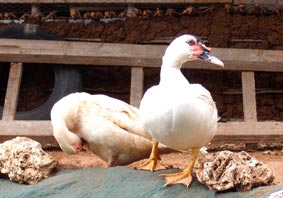 |
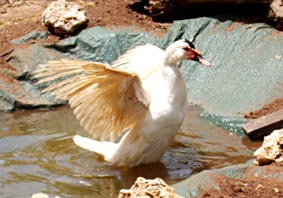 |
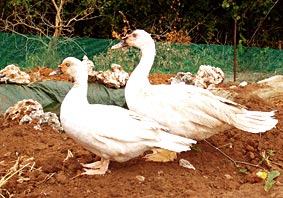 |
||
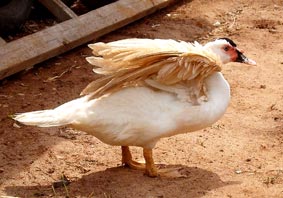 |
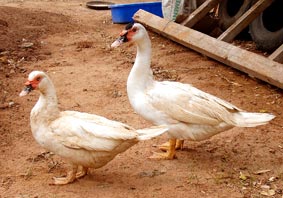 |
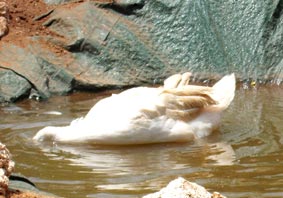 |
||
|
|
|
|
||
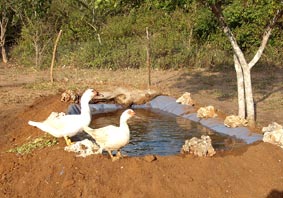 |
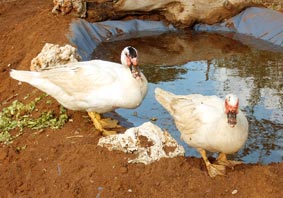 |
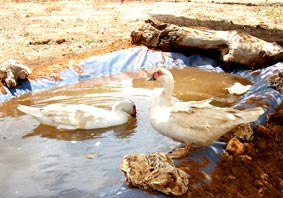 |
||
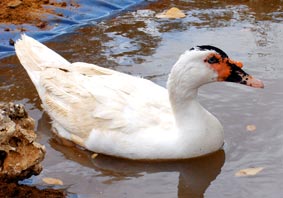 |
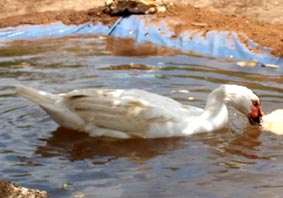 |
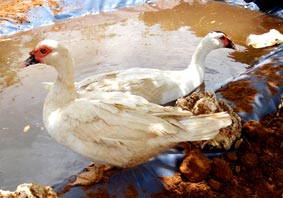 |
||
| The short life of our Muscovy ducks. These two ducks, a friend from Tana River gave me as a gift. He had even brought them up. This is a special honor to me. He had tied each together on both feet placed in a cardboard box, tied with cord and handed over to me. The 6 hour drive on the dusty nature road and the extreme heat inside the car has probably not hurt them. When I unpacked them they were all brown. Now we had to produces a pond of water and we built as fast as possible a small temporary pool. When we free the animals directly on the water, they do not even want the water. Also to spray they did not enjoy. May be they were just so shocked by the long trip and we have simply left them alone and showed them where they can sleep tonight. The next morning it looked different. Fresh food and the male dared very carefully into the fresh water. So it went, day after day. If you called them, they ran like little dogs chasing you. Especially at feeding time. After some weeks the small pool was leaking and the water seeped slowly. A new pond was needed. Should be greater than the first. I had a big old tarp that was suitable and we built a new pond for our ducks. This pond was really deep and it was a great splash paradise for two, located directly under a small shade tree. A super pool. We were not home when it happened. It was another night, probably a badger, he dug with his big front paws through the not very strong clay wall and hey presto he's inside and killed with a silent bite one after another and drags her to his lair. There has not been a great fight, only a few small feathers lying on the ground, but the hole in the wall spoke for themselves. We had to think about often these cute ducks and especially when we have given the morning feed and the two were no longer there. I think these ducks have lived from the beginning always with people and in their homes and they were not used the hard life in the wilderness. But we have had a lot of joy with them. There
where the two came from people had taken them in the evening for safety
always in the living room but unfortunately we did not provide a stone
house for the animals in which they are truly safe from predators. So
I think it was a right decision that I bought no more ducks any more.
So cute they are.
| ||||
|
||||
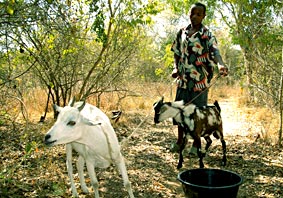 |
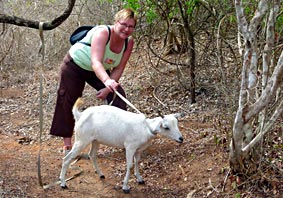 |
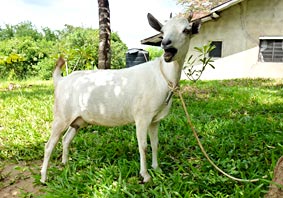 |
||
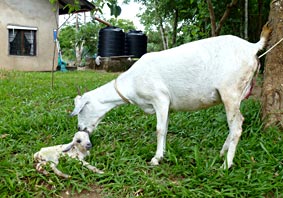 |
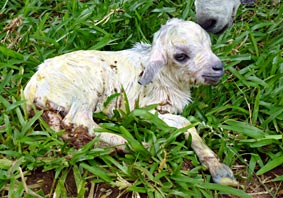 |
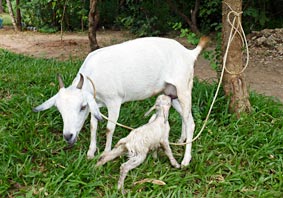 |
||
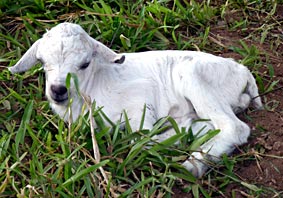 |
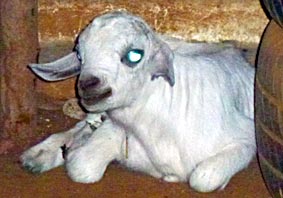 |
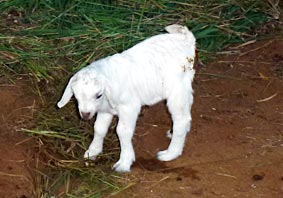 |
||
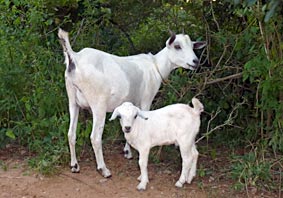 |
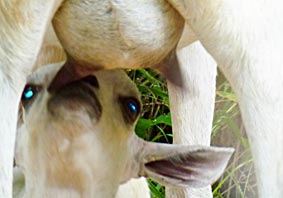 |
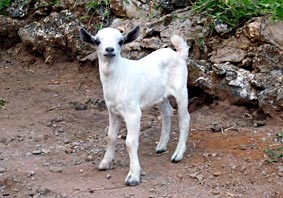 |
||
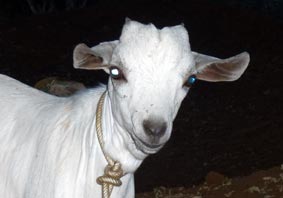 |
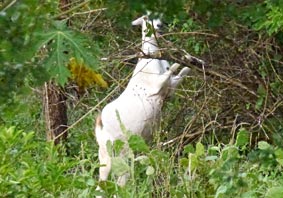 |
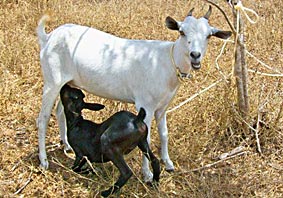 |
||
|
Goats,
pure joy of living.
One day we got the idea that one or two goats could enrich the farm life. This is not to say now that we have here boredom, but Mwalimu wanted to "contact" if we're not available in person at the farm. It really speaks to the goats, and I am always amazed when he told me what they have just whispered to him. It all started with a male and a female. Mwalimu morning brought the animals in the bush, where they spent the day with food. Afternoon he brought it back to the dugout. He always put them to other locations in the bush, there were times that they the barren dry grass and young branches, at least during the dry season, eat and talk. For particularly large heat they got then in addition to drinking. It took 1 year, 2 years, and even more, and we were surprised that still no hired talent. Mwalimu suddenly brought the glad tidings, announcing that the goat was pregnant. We could not believe it, but in fact, 22 November 2011 was born on a small farm Wanderers white male kids. We named him "Jumper". He was very fun to watch when he with all four legs off the ground like a spring jerked himself up and made his jumps. He was a real "giddy". Now he's grown up and the typical capers have also subsided. Nevertheless, it is still repeatedly placed to any juvenile pranks. Almost exactly one year later, the white jumper got a black brother. In order that no one had really expected and now we have 4 goats. A name has not yet been the little black lugs, but he is just as vibrant as it used to be white brother. Whether in the wild or on the farm, it is always a pleasure to observe animals. Especially if you see happy animals that can move freely and that they can develop in a normal environment. Since the goat family was getting bigger, meanwhile here are 5 goats. Now we had to figure out something. They fed us in literally out of house. When we took her into the bush, they destroyed everything fresh greens. That's why we have it then fenced. In the dry season Mwalimu could not zoom enough fodder hauling. Since it was a lot of time to organize food for the little "Nimmersatte". We decided to bring the goats in another area, where it is green and lush during dry periods. Mwalimu knows a place near where prevails a very different vegetation. I gave him the goats and they are now very happy there and even get more offspring. So although we have no more goats on the farm, but are glad that we have found this solution for jumpers and Co. |
||||
Back
to |
Home |
